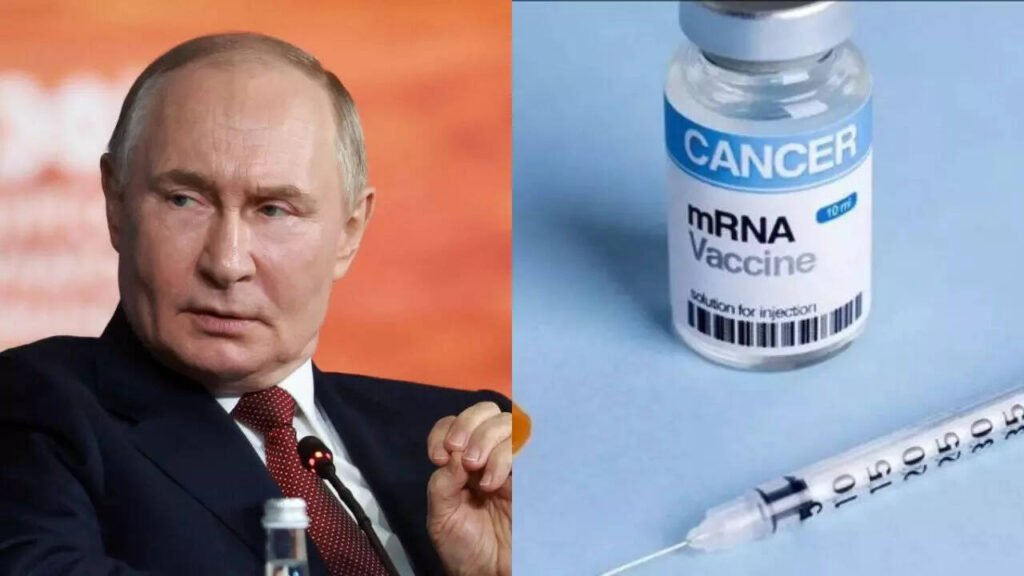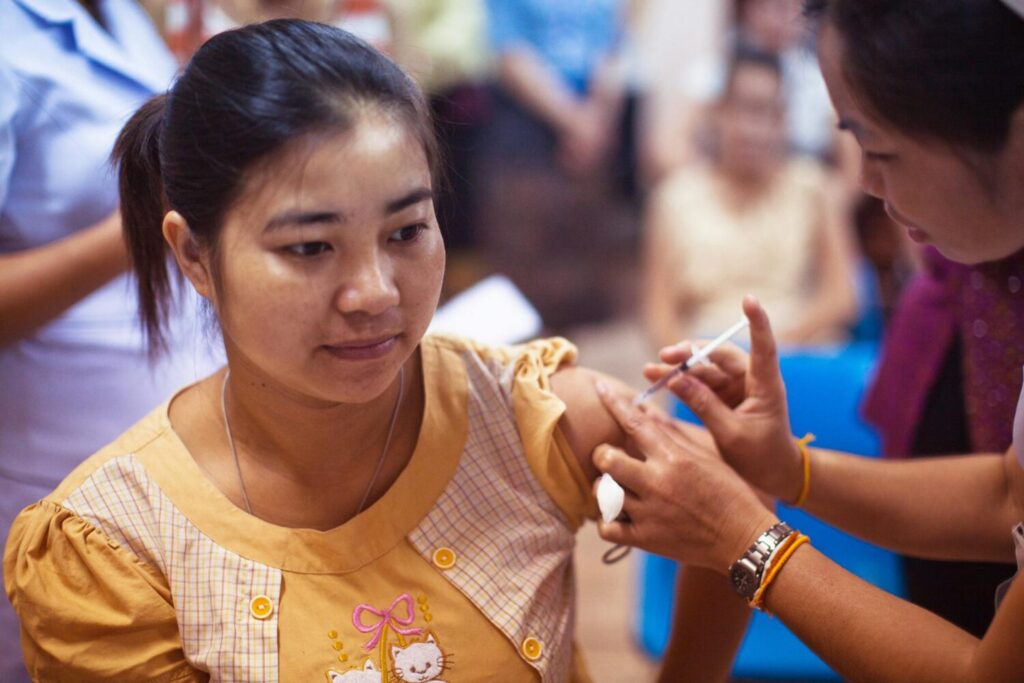By YTC Ventures, Technocrat Magazine
Published: 9 September 2025
In a bold stride toward revolutionizing cancer treatment, Russia’s Enteromix, a personalized mRNA-based cancer vaccine, has captured global attention with claims of 100% efficacy and safety in early clinical trials. Unveiled at the 2025 St. Petersburg International Economic Forum and further highlighted at the Eastern Economic Forum, this innovative therapy promises to redefine oncology by leveraging cutting-edge biotechnology.
But how does Enteromix work, who is behind it, what will it cost, and what does it mean for the global MedTech startup ecosystem? Let’s dive in.
Human Trials: Promising Early Results
Enteromix has completed Phase I clinical trials, involving 48 volunteers primarily targeting colorectal cancer, with additional research into glioblastoma and melanoma. Conducted by Russia’s National Medical Research Radiological Centre (NMRRC) in collaboration with the Engelhardt Institute of Molecular Biology (EIMB), the trials reported remarkable outcomes: all patients showed a positive immune response, significant tumor shrinkage, and no serious side effects. In preclinical studies, Enteromix slowed tumor growth by 60–80% in some cases and even achieved complete tumor regression in others.

These results are striking, especially for a Phase I trial, which typically focuses on safety rather than efficacy. However, experts urge caution. The small sample size and lack of published, peer-reviewed data raise questions about generalizability. Larger Phase II and III trials are essential to confirm these findings across diverse populations. As Dr. Vikram Chandra, an oncologist at AIIMS Delhi, noted, “Science moves forward not by press releases but by published data.”
How Enteromix Works: A Dual-Pronged Attack
Enteromix stands out for its innovative use of two advanced biotechnologies: personalized mRNA and oncolytic viruses. Like the mRNA vaccines developed for COVID-19 by Pfizer-BioNTech and Moderna, Enteromix uses messenger RNA to instruct the immune system to recognize and attack cancer-specific proteins. Each dose is tailored to a patient’s unique tumor genomic profile, ensuring precision targeting.
Additionally, Enteromix incorporates four non-pathogenic viruses designed to directly attack cancer cells. These oncolytic viruses selectively infect and replicate within tumors, causing them to burst and release cancer-specific antigens. This amplifies the immune response, creating a synergistic effect that both destroys tumors and trains the body to prevent recurrence. Unlike traditional treatments like chemotherapy, which harm healthy cells, Enteromix’s targeted approach minimizes side effects, offering a safer alternative.

The Developers: A Russian Research Powerhouse
Enteromix is a product of collaboration between the NMRRC, under Russia’s Ministry of Health, and the EIMB, part of the Russian Academy of Sciences. The project, backed by the Federal Medical and Biological Agency (FMBA), reflects years of research, including three years of preclinical studies. FMBA head Veronika Skvortsova announced the vaccine’s readiness for clinical use, pending final approval from the Ministry of Health, expected in the coming weeks.
This partnership underscores Russia’s growing investment in biotechnology, with events like the St. Petersburg International Economic Forum showcasing its ambitions to lead in medical innovation.
The NMRRC and EIMB are leveraging their expertise in radiology, molecular biology, and virology to position Enteromix as a global contender in immuno-oncology.
Cost and Pricing: An Open Question
Details on Enteromix’s cost remain scarce, as pricing has not been publicly disclosed. Personalized mRNA vaccines, due to their tailored nature, require sophisticated genomic profiling and manufacturing processes, which can drive costs significantly higher than traditional vaccines.
For comparison, personalized mRNA cancer vaccines in development by companies like Moderna and BioNTech are estimated to cost tens of thousands of dollars per patient in Western markets, factoring in genetic sequencing, production, and delivery logistics like cold-chain storage.

Russia’s government has suggested that Enteromix could be provided free to patients within the country starting in early 2025, indicating a potential state-subsidized model. However, for international markets, pricing will likely depend on regulatory approvals, production scalability, and partnerships with global biotech firms. Without official figures, estimates remain speculative, but affordability will be critical for widespread adoption, especially in low- and middle-income countries with high cancer burdens.
Will Russia Share Enteromix with the World?
Russia’s intentions regarding global distribution are promising but vague. The FMBA has expressed a vision for international access, with discussions likely underway to navigate regulatory pathways in markets like the EU and US, where competitors like Moderna and BioNTech are already in advanced trial stages. A report from RT India suggested Russia may distribute the vaccine “for free,” but this claim lacks clarity and may refer to domestic distribution rather than global philanthropy.
Geopolitical tensions and sanctions could complicate international collaboration. Russia’s history of vaccine diplomacy, as seen with Sputnik V during the COVID-19 pandemic, suggests a willingness to share medical innovations to bolster global influence.
However, regulatory hurdles, intellectual property concerns, and the need for independent validation by global health authorities may delay widespread access. Collaboration with international biotech firms or licensing agreements could accelerate distribution, but no concrete plans have been confirmed.
The Future of MedTech in the Startup Ecosystem
Enteromix’s early success highlights the transformative potential of mRNA and oncolytic virus technologies, signaling a bright future for MedTech startups. The global race for personalized cancer vaccines is heating up, with companies like BioNTech, Moderna, and CureVac advancing similar therapies. This competitive landscape offers opportunities for startups to innovate in areas like genomic sequencing, AI-driven mutation profiling, and scalable mRNA production.

For the MedTech startup ecosystem, Enteromix’s development underscores several trends:
- Personalized Medicine: Startups focusing on individualized therapies, such as tumor-specific vaccines or diagnostics, are likely to attract significant investment. AI and machine learning will play a critical role in analyzing tumor genomics efficiently and cost-effectively.
- Oncolytic Viruses: The use of non-pathogenic viruses in cancer therapy is gaining traction. Startups exploring viral-based immunotherapies could find a niche, especially if they can improve delivery mechanisms or combine them with other modalities like mRNA.
- Global Collaboration: The complexity of personalized vaccines requires partnerships across borders. Startups that can navigate international regulatory frameworks or offer solutions for cold-chain logistics and production scalability will be in high demand.
- Affordability and Access: The high cost of personalized therapies poses a challenge. Startups developing cost-effective manufacturing or distribution models could disrupt the market, making treatments like Enteromix accessible to broader populations.
However, challenges remain. Early-stage MedTech startups face high R&D costs, lengthy regulatory processes, and the need for robust clinical data. Enteromix’s 100% efficacy claim, while exciting, must be scrutinized through peer-reviewed studies and larger trials to avoid overhype, a common pitfall in the biotech sector. Investors and entrepreneurs should prioritize transparency and rigorous validation to build trust and secure funding.
Conclusion: A Step Toward a Cancer-Free Future?
Enteromix represents a bold leap in cancer immunotherapy, combining mRNA precision with oncolytic virus innovation. Its early trial results are promising, but the path to global adoption is fraught with scientific, regulatory, and logistical hurdles. While pricing remains uncertain, Russia’s potential to offer the vaccine free domestically could set a precedent for subsidized models elsewhere. For the MedTech startup ecosystem, Enteromix is a clarion call to innovate in personalized medicine, scalability, and accessibility.
As the world awaits larger trials and peer-reviewed data, Enteromix stands as both a beacon of hope and a reminder of the rigorous path science must tread. If validated, it could transform cancer from a terminal illness into a manageable condition, offering millions a new lease on life. For now, the global oncology community watches Moscow with cautious optimism, eager for the next chapter in this promising story.

Comments